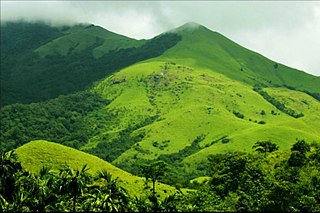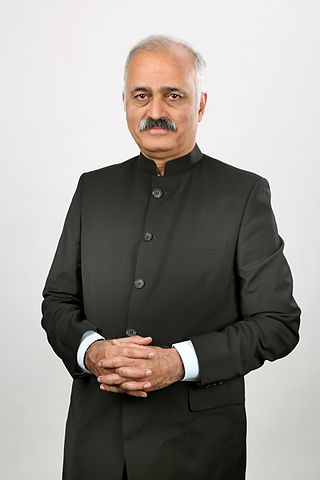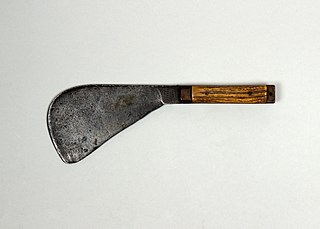The Kodava is a Dravidian language spoken in Kodagu district (Coorg) in Southern Karnataka, India. It is an endangered The term Kodava has two related usages. Firstly, it is the name of the Kodava language and culture followed by a number of communities from Kodagu. Secondly, within the Kodava-speaking communities and region (Kodagu), it is a demonym for the dominant Kodava people. Hence, the Kodava language is not only the primary language of the Kodavas but also of many other castes and tribes in Kodagu. The language has two dialects: Mendele and Kiggat.

Kodagu district is an administrative district in the Karnataka state of India. Before 1956, it was an administratively separate Coorg State, at which point it was merged into an enlarged Mysore State.

Madikeri is a hill station town in Madikeri taluk and headquarters of Kodagu district in Karnataka, India. Its original name was Muddurajanakeri which means "the city of Mudduraja".

Codava National Council, is a social organisation in the Indian state of Karnataka. Formerly CNC was known as KRMM. The KRMM demanded a separate statehood status for Kodagu until the 1990s. Later they scaled down their demand. Ever since they have been demanding a Kodava hill council in Kodagu. The CNC Organisation's President is Nandineravanda U. Nachappa Codava.

Ashadha or Aashaadha or Adi is a month of the Hindu calendar that corresponds to June/July in the Gregorian calendar. In India's national civil calendar, this month is the fourth month of the year, beginning on 22 June and ending on 22 July. In Hindu astrology, Ashada begins with the Sun's entry into Gemini. It is the first of the two months that comprise the monsoon season.

The Kodava people or Kodavas or Codavas are an ethno-linguistic group from the region of Kodagu in the southern Indian state of Karnataka, who natively speak the Kodava language. They are traditionally land-owning agriculturists and patrilineal, with martial customs. Kodavas worship ancestors and weapons. They used to worship swords, bows, arrows and later guns. Hence, Kodavas are the only ones in India permitted to carry firearms without a license.

Chikavira Rajendra or Chikka Vira Rajendra, was the last ruler of the Kodagu (Coorg) kingdom in South India. His actual name was Vira Rajendra, but this was the name of his uncle as well; as both of them were rulers of Kodagu, the prefix Chikka is used as a distinguisher. He was a son of Linga Rajendra II.

The district of Kodagu in present-day Karnataka comprises the area of the former princely state of the same name.

Bhagamandala is a pilgrimage place in Kodagu district of the Indian state of Karnataka.
The clan of Kodavas in the Indian state of Karnataka have a long history of association with the game of field hockey. The district of Kodagu which is the land of the Kodavas is considered as the cradle of Indian hockey. More than 50 Kodavas have represented India in international hockey tournaments, out of which 7 have also participated in Olympics. B P Govinda, M P Ganesh, M M Somaiya, C S Poonacha are some of the prominent Kodavas who have represented India. The passion for hockey in Kodagu is so much that more than 200 families participate in an annual hockey festival. This festival is recognised as one of the largest field hockey tournaments in the world and has been referred to the Guinness Book of Records. However it has already found a mention in the Limca Book of Records, which is an Indian variant of the Guinness Book.
The captivity of Kodavas (Coorgis) at Seringapatam was the period of capture, deportation, and imprisonment of Kodava Takk speaking Coorgi Christians who rebelled against Tippu Sultan, the de facto ruler of the Kingdom of Mysore, they (60,000-70,000) were caught during a number of attempts to suppress their rebellion in the 1780s.
Nadikerianda Chinnappa (1875–1931) was an Indian compiler, poet, translator, army man, police officer, cricket player, singer and philanthropist from Kodagu.

The Pattole Palame is a compilation of Kodava folksongs first published in 1924. It was compiled by Nadikerianda Chinnappa.

An ainmane is the ancestral house of a clan with roots in Kodagu.

Palanganda T. Bopanna is an author and journalist from Kodagu (Coorg) in Karnataka, India. Bopanna has worked for some of the leading Indian English dailies, including The Times of India, Bangalore, for 12 years, and The Pioneer, as their Special Correspondent (Bangalore) for 13 years. He has written five books.

Pichangatti is a broad-bladed knife of the Kodavas of Karnataka, India. The characteristic of the pichangatti is its silver hilt with bulbous-shaped pommel in the shape of a parrot's head. The pichangatti features in the traditional male dress of the Kodavas.

Ayudha katti is an indigenous weapon of war and tools to the Kodava people of Kodagu, in the state of Karnataka, India. The ayudha katti is developed from an implement used to cut through dense undergrowth. Unlike most blades, the ayudha katti is worn without a sheath.
Nitin Kushalappa is an Indian author of books and articles.
37 (Coorg) Field Regiment is part of the Regiment of Artillery of the Indian Army.











